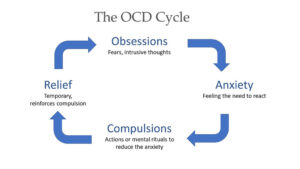Obsessive-Compulsive Disorder (OCD) is a mental health condition characterized by persistent, unwanted thoughts (obsessions) and repetitive behaviors or mental acts (compulsions) that an individual feels driven to perform in response to the obsessions. These obsessions and compulsions can significantly interfere with daily life and cause distress.

Obsessions
- Obsessions are intrusive and distressing thoughts, images, or urges that repeatedly enter an individual’s mind.
- These thoughts can cause anxiety, fear, or discomfort.
- Examples of obsessions include fears of contamination, fears of harming oneself or others, excessive concern with symmetry or order, and intrusive sexual or violent thoughts.
Compulsions
- Compulsions are repetitive behaviors or mental acts that a person feels compelled to perform in response to their obsessions.
- The goal of compulsions is to reduce anxiety or prevent a feared event, even though the compulsions themselves can be excessive and irrational.
Common compulsions include washing, checking, counting, repeating actions, and mental rituals like repeating phrases silently.
Cycle of OCD
The cycle of OCD often involves a feedback loop. Obsessions trigger anxiety, and compulsions provide temporary relief from that anxiety. However, the relief is short-lived, and the cycle continues as the obsessions return.

Impact on Daily Life
- OCD can significantly disrupt a person’s life, affecting relationships, work, and daily activities.
- The time and energy spent on performing rituals can be overwhelming and leave little room for other tasks and interests.
Causes
- The exact cause of OCD is not fully understood, but it’s believed to be a combination of genetic, neurological, behavioral, cognitive, and environmental factors.
- Brain abnormalities and imbalances in neurotransmitters like serotonin are thought to play a role.
Diagnosis
A mental health professional, often a psychiatrist or psychologist, diagnoses OCD based on the presence of obsessions and compulsions that significantly interfere with daily functioning.
Treatment
- Cognitive Behavioral Therapy (CBT): Exposure and Response Prevention (ERP) is a specific form of CBT commonly used for treating OCD. It involves gradually exposing the individual to their obsessions while preventing them from engaging in compulsions.
- Medications: Selective serotonin reuptake inhibitors (SSRIs), which are a type of antidepressant, are often prescribed to help manage the symptoms of OCD.
Self-Help Strategies
- Learning about OCD and its treatment can be empowering.
- Connecting with support groups or therapy communities can provide understanding and a sense of belonging.
- Stress reduction techniques, mindfulness, and relaxation exercises can also be helpful.
Prognosis
- With appropriate treatment and support, many individuals with OCD can experience significant improvement in their symptoms.
- Some people may continue to experience mild symptoms, while others might find their symptoms more manageable or even remit entirely.
Finally, it’s important to recognize that OCD is a legitimate mental health condition that requires understanding and support. If you or someone you know is struggling with OCD, seeking professional help is crucial for effective management and recovery.










